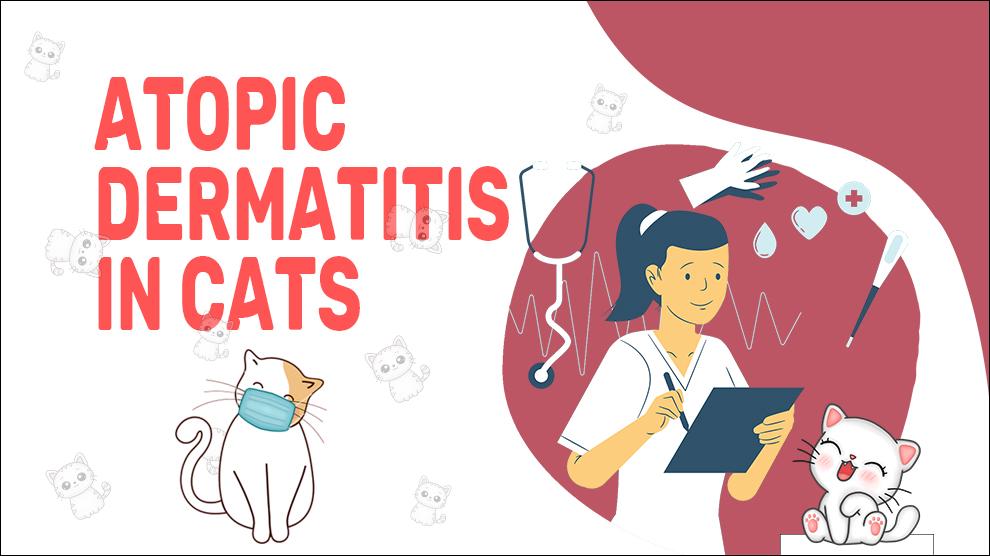What Is Atopic Dermatitis In Cats?
Atopic dermatitis is a common skin condition that affects cats. It is a chronic, inflammatory condition that can cause intense itching and discomfort for affected cats.
Atopic dermatitis is caused by an overactive immune response to environmental allergens, such as pollen, dust mites, or mold spores.
While there is no cure for atopic dermatitis, there are a variety of treatment options that can help manage symptoms and improve the quality of life for affected cats.
Clinical Signs Of Atopic Dermatitis In Cats
The most common symptom of atopic dermatitis is intense itching, which can cause cats to scratch, lick, or bite at their skin.
This can lead to further skin irritation and secondary infections.
- Crusting On The Skin
- Hair loss
- Scabby Skin
- Thickening Of The Skin
- Scaly Skin
- Bad Smelly Skin
- Excessive Licking
- Excessive Scratching Of The Neck
- Skin Lesions
- Red Bumps On Skin
- Crusting Or Scabs In The Ears
Treatment Options For Atopic Dermatitis In Cats
Treatment of atopic dermatitis in cats typically involves a combination of therapies, including:
- Avoidance of allergens: The first step in managing atopic dermatitis is to identify and avoid allergens that trigger symptoms. This may involve making changes to your cat's environment, such as using air purifiers or hypoallergenic bedding or modifying their diet to eliminate potential food allergens.
- Topical treatments: Topical treatments, such as medicated shampoos, creams, or sprays, can help soothe skin irritation and reduce inflammation. These treatments may contain ingredients like corticosteroids or antihistamines.
- Oral medications: In some cases, oral medications, such as corticosteroids or immunosuppressive drugs, may be prescribed to manage severe symptoms or prevent secondary infections.
- Allergy immunotherapy: Allergy immunotherapy, also known as "allergy shots," involves exposing cats to small amounts of allergens over time to desensitize their immune system. This treatment can be effective in reducing symptoms of atopic dermatitis, but it can be expensive and time-consuming.
Home Remedies For Atopic Dermatitis In Cats
While there is no substitute for proper veterinary care, there are some home remedies that pet owners can try to help manage the symptoms of atopic dermatitis in cats.
These include keeping the house clean and free of potential allergens, such as dust, mold, and pollen, providing your cat with a high-quality diet that is rich in essential nutrients, and using natural remedies such as oatmeal baths or herbal supplements to help soothe irritated skin.
However, it is important to consult with your veterinarian before trying any home remedies, as they may interact with other medications or medical conditions.
How To Prevent Atopic Dermatitis In Cats?
Preventing atopic dermatitis in cats can be challenging, as it is caused by an overactive immune response to environmental allergens.
However, there are some steps that pet owners can take to minimize their cat's exposure to potential allergens, such as:
- Keep the house clean: Regular cleaning can help reduce the presence of environmental allergens, such as dust mites and mold spores. Vacuuming, dusting, and washing bedding regularly can help minimize allergen exposure.
- Minimize outdoor exposure: Keeping cats indoors during peak pollen season can help minimize exposure to potential allergens. Additionally, avoiding areas with high levels of mold or pollen, such as wooded areas or fields, can help reduce the risk of exposure.
- Feed a high-quality diet: Providing your cat with a balanced and nutritious diet can help support its overall health and immune function. Additionally, eliminating potential food allergens from your cat's diet may help reduce the risk of developing atopic dermatitis.
Affected Cat Breeds Of Atopic Dermatitis
Causes For Atopic Dermatitis In Cats
Causes:
Atopic dermatitis is caused by an overactive immune response to environmental allergens.
This means that affected cats have an abnormal reaction to substances that are normally harmless, such as pollen, dust mites, or mold spores.
While the exact cause of this overactive immune response is not fully understood, it is believed to be a combination of genetic and environmental factors.
When To See A Vet For Atopic Dermatitis In Cats?
If you suspect that your cat may be suffering from atopic dermatitis, it is important to seek veterinary care as soon as possible.
Early diagnosis and treatment can help minimize the impact of the condition and improve your cat's quality of life.
With proper management and care, cats with atopic dermatitis can live happy and healthy lives.
Food Suggestions For Atopic Dermatitis In Cats
In terms of diet, providing your cat with a high-quality, balanced diet that is rich in essential nutrients can help support their overall health and immune function.
Some pet owners may also choose to feed their cats a hypoallergenic or limited-ingredient diet, which can help reduce the risk of allergic reactions that may contribute to atopic dermatitis.
Conclusion
Atopic dermatitis is a common skin condition that can cause significant discomfort and distress for affected cats.
While there is no cure for atopic dermatitis, there are a variety of treatment options available that can help manage symptoms and improve the quality of life for affected cats.
It is important for pet owners to work closely with their veterinarians to develop a treatment plan that is tailored to their cat's individual needs and symptoms.











